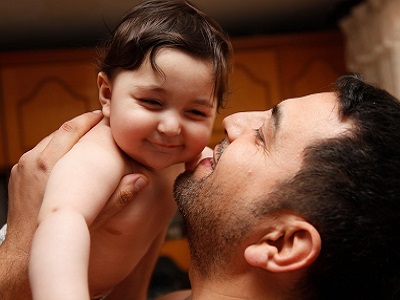Cover image: © UNICEF/UN0118566/McConnico
Engaging fathers in an infants' process has amazing effects in mothers, children and in other men. Involved fathers from the prenatal phase help children to reach their full potential.
The courses contained in the resources for home visitors were designed to upgrade and enhance the role of home visitors and to provide them with essential knowledge and tools in order to support and engage the families of young children. Well-trained, respectful, sensitive and family centred home visitors can build on this motivation and contribute to strengthening parenting competencies family resilience and children well-being.
The modules were prepared through a consultative process involving international and regional experts, national trainers and home visiting professionals. Because parenting is mediated by cultural values and beliefs, these generic courses can be adapted to specific country contexts and enriched with local examples and tools.
The courses encourage home visitors to take a strengths-based approach, to promote robust caregiver-child relationships and contribute to reducing risk by supporting and referring families to other services as needed. We trust that training based on these courses will enable home visitors to develop positive, respectful and sensitive relationships with families; help them to assess regularly the strengths and needs of individual children and their caregivers; and assist them to support and empower parents for informed actions and decisions with regard to their young children’s health, wellbeing and development.
Learning objectives
By the end of this module you will:
- Understand why engaging with fathers is becoming more important in policy and in practices.
- Understand fathers’ impact on infants, children and mothers, and the impact of fatherhood on men.
- Be aware of common negative attitudes to men and fathers that undermine successful engagement.
- Know how to get more fathers ‘through the door’.
- Better understand how to engage productively with fathers when they are in the room while you are visiting the family.
- Know where to find more information about fathers and fatherhood.
Methodology
This course is composed of eight sections, including various examples, activities and assessments. This e-learning activity can be taken as stand-alone course or as part of the Home Visitors resources modules .
Audience
- This course is intended for home visitors and home nurses to learn important information about how to engage fathers in infants development process, so they can educate parents and caretakers on these techniques.
- This course is also open to parents, caregivers and UNICEF staff and UNICEF partners.
Length
It will take you about 1.5 hours to complete this self-paced course.
Structure
This course is composed of eight sections:
- Introduction
- The global importance of fathers
- Fathers and fatherhood: impact on fathers and mothers
- Fathers' impact on children
- Common perceptions of fathers
- Your role in supporting fathers in families
- Best practice engaging fathers
- Best practice in working with fathers
Contact details
For content queries, questions and suggestions please contact Silvia Sanchez (sasanchez@unicef.org) or Aleksandra Jovic (ajovic@unicef.org)
For technical issues, please contact the Agora team (agora@unicef.org)
